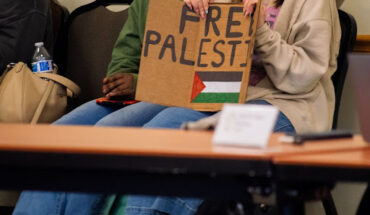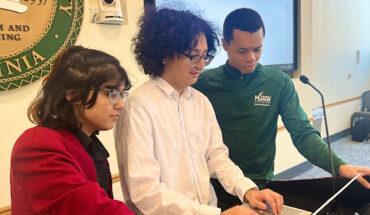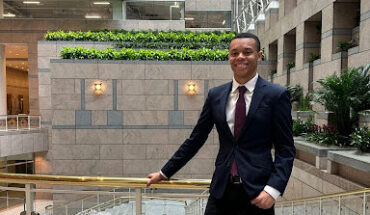This story was originally published in the Feb. 9 issue of Fourth Estate.
MakeSpace is a progressive Muslim organization located in Alexandria that practices Islam through peaceful, all-inclusive acts of service. MakeSpace defines itself on its Facebook page as “an inclusive and transparently-managed hub for the D.C. area Muslim community.”
Senior and former MakeSpace volunteer Naila Rafique said the organization’s importance as increased in light of the recent attack on the Parisian newspaper, Charlie Hebdo, which brought radical Islam into the global media conversation again. Coupled with radical demonstrations by ISIS militants, people have been linking Islam to violence, according to CNN.
“I do not think it’s only important but essential rather for a Muslim community to have an organization like MakeSpace in this very volatile time, especially for the Muslim youth in America,” said Rafique.
MakeSpace was founded in 2012 and has since witnessed continuous growth. Their website states that the inspiration for the name comes from the Qur’an. The version on the website is from Surah al-Mujadilah verse 58:11 which says, “rise and make space for others so that Allah will make space for you in His grace.” This verse is the inspiration and foundation for the organization.
MakeSpace aims to draw its members closer to Allah by eliminating distractions in society, particularly distractions that target today’s youth. One of the ways members work to achieve this is by focusing their efforts on productive acts of service.
Volunteers represent the MakeSpace mission by exhibiting selflessness through serving the community. Some outreach programs include distributing meals to the homeless in D.C., volunteering at the ALIVE food pantry in Alexandria, and their Adopt-A-Highway initiative.
Makespace’s pledge statement urges Muslims to “categorically cease all attacks on individual Muslims and organizations, especially urging the immediate cessation of all implicit or explicit charges of disbelief.”
As a part of their effort to be inclusive within the Muslim community, they have stated their efforts are focused on non-secular acts of service and productiveness. The mission statement includes that the tension within the Muslim community is caused by the emphasis on certain rituals. These rituals have caused divisions in the community and have pushed the youth to one extreme or another, like what is seen in radicalism.
MakeSpace offers an invitation to those who are willing to focus on bettering the local community. The organization believes that focusing energy on inclusion and unification in the name of Allah is more productive than focusing only on divisive issues.
Mason student and current volunteer Sarah Olibah explained that MakeSpace is not focused on helping individuals of just one particular faith, but on the improvement of all humanity.
“These experiences keep us humble, they remind us of our blessings, they make us aware of the needs within our own community, and they allow us to fulfill the obligation that we have to our neighbors as Muslims to take care of one another,” Olibah said.
Olibah said MakeSpace is a place where people can come and experience the true meaning of being an American Muslim. The main focus is establishing an inclusive space.
“As Muslims, we must take care of one another regardless of differences. It is about growing both spiritually and intellectually. At MakeSpace we can grow, learn, care, and deepen our connection to God and to one another,” Obilah said.
According to the mission statement, MakeSpace’s focus on Muslim youth empowers its members to become future leaders.
“It is important to allow the youth to take hold of our community and to allow them to lead in a way that will address the most relevant and prominent issues that we are surrounded with,” Obilah said.
MakeSpace is currently addressing issues such as health and civic engagement. The volunteer- based organization offers a place to get involved regardless of age, beliefs, or background.
“We hold many different programs through our branches of recreation, education, community service, and high school membership. There is a space for every interest from Public Relations to sports to civic engagement,” said Olibah.
Rafique describes her previous volunteer experience at MakeSpace as “immensely beneficial” in many aspects of her life.
“I have become closer to my community by interacting with all types of people from all walks of life. I have further benefitted by polishing my identity as an American Muslim woman,” Rafique said. The positive change that volunteering causes in an individual’s life was present in her experience at MakeSpace, according to Rafique.
“The countless blessings and prayers I have received from setting the prayer mats, to helping serve the food, and even long nights of cleaning up, are all small ways in which I have helped serve the Muslim community,” said Rafique.
According to Rafique, the opportunity for Muslims to gather in an inclusive environment to pray, serve, and socialize is what attracts so many to MakeSpace. She says the attendance for weekly prayer and various other events often reaches over 500 people.
Rafique said the inclusiveness of all members of the Muslim community is a distinguishing factor. The manner in which the organization cuts across all nationalities to provide a hub for the Muslim faith is something that is rarely found elsewhere.
“It is easy to go to a mosque run by Arabs, Pakistanis, etc. but this in some regard only polarizes the youth. Islam is not a faith of one kind of people; it is a religion of many people from Burkina Faso to Malaysia, from Tibet, to America, and further,” Rafique said.
Freshman at Mason Omar Abderhman believes that the misinterpretation of the principle beliefs of the Islamic faith is detrimental to the Muslim community.
“The large misconception and false stereotypes are negatively impacting the entire Muslim world. One third of the world’s population is Muslim, yet people allow the small extremist groups to shape their perception of all Muslims.” Abdherman said.
Abderhman, like many others, believes that people must educate themselves on the principle beliefs of Islam in order to realize the small extremist groups are the polar opposite of what constitutes the vast majority of the Muslim community.
“The small extremist groups terrorize in the name of Islam but in reality their actions are prohibited in Islam. Islam is a religion of peace and forgiveness. Muslims are not the violent, close-minded people that the media tends to portray,” said Abderhman.
Sanna Naqash, who serves on the Public Relations team at MakeSpace, describes the controversies in the Muslim community as a distraction from what really matters in the Islamic faith.
“I feel the biggest issue in our Muslim community is when brothers and sisters feel deprived of fitting in with the rest of the community. MakeSpace is not just an organization where men and women mingle, but it is a safe haven. A home.”
Naqash feels that no matter what debates are currently polarizing the Muslim community, it is important to stand together in the name of what is right.
“Whether people in the Muslim community erred or are not as pious or practicing as the other individuals in the community, there is no reason one should feel like they wouldn’t or couldn’t fit in and grow closer to God,” said Naqash.
MakeSpace’s pledge statement conveys its mission to serve as a place to make the community a part of the solution. This is achieved by seeking common sense solutions to common challenges in light of the universal as well as Islamic values of compassion, cooperation, and service to God’s creation.
Photo credit: Makespace




